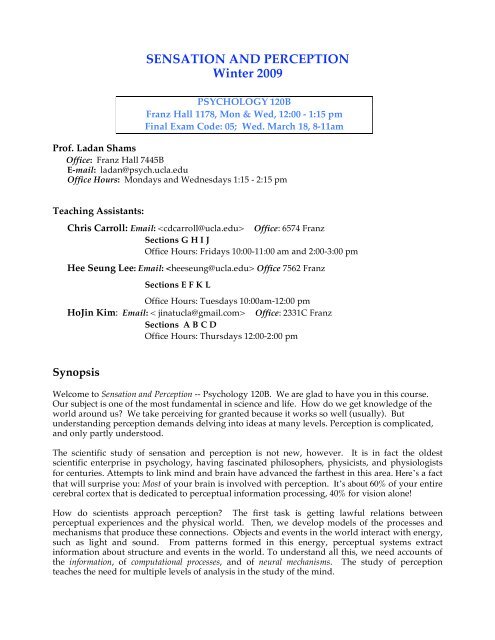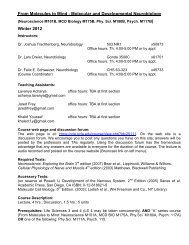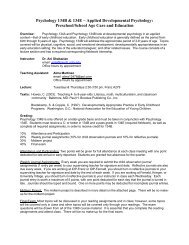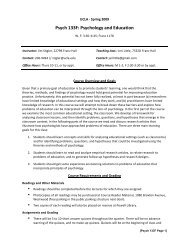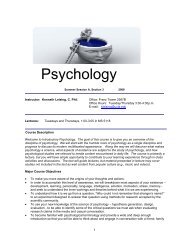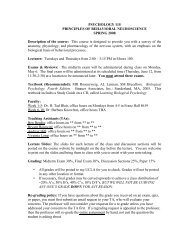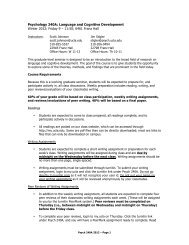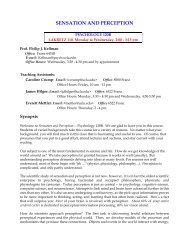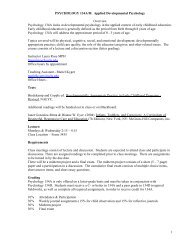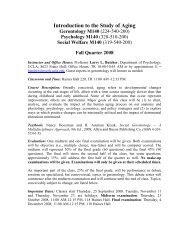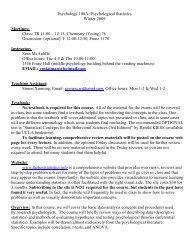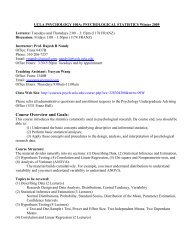SENSATION AND PERCEPTION Winter 2009 - Courses in Psychology
SENSATION AND PERCEPTION Winter 2009 - Courses in Psychology
SENSATION AND PERCEPTION Winter 2009 - Courses in Psychology
Create successful ePaper yourself
Turn your PDF publications into a flip-book with our unique Google optimized e-Paper software.
<strong>SENSATION</strong> <strong>AND</strong> <strong>PERCEPTION</strong><strong>W<strong>in</strong>ter</strong> <strong>2009</strong>PSYCHOLOGY 120BFranz Hall 1178, Mon & Wed, 12:00 - 1:15 pmF<strong>in</strong>al Exam Code: 05; Wed. March 18, 8-11amProf. Ladan ShamsOffice: Franz Hall 7445BE-mail: ladan@psych.ucla.eduOffice Hours: Mondays and Wednesdays 1:15 - 2:15 pmTeach<strong>in</strong>g Assistants:Chris Carroll: Email: Office: 6574 FranzSections G H I JOffice Hours: Fridays 10:00-11:00 am and 2:00-3:00 pmHee Seung Lee: Email: Office 7562 FranzSections E F K LOffice Hours: Tuesdays 10:00am-12:00 pmHoJ<strong>in</strong> Kim: Email: < j<strong>in</strong>atucla@gmail.com> Office: 2331C FranzSections A B C DOffice Hours: Thursdays 12:00-2:00 pmSynopsisWelcome to Sensation and Perception -- <strong>Psychology</strong> 120B. We are glad to have you <strong>in</strong> this course.Our subject is one of the most fundamental <strong>in</strong> science and life. How do we get knowledge of theworld around us? We take perceiv<strong>in</strong>g for granted because it works so well (usually). Butunderstand<strong>in</strong>g perception demands delv<strong>in</strong>g <strong>in</strong>to ideas at many levels. Perception is complicated,and only partly understood.The scientific study of sensation and perception is not new, however. It is <strong>in</strong> fact the oldestscientific enterprise <strong>in</strong> psychology, hav<strong>in</strong>g fasc<strong>in</strong>ated philosophers, physicists, and physiologistsfor centuries. Attempts to l<strong>in</strong>k m<strong>in</strong>d and bra<strong>in</strong> have advanced the farthest <strong>in</strong> this area. Here’s a factthat will surprise you: Most of your bra<strong>in</strong> is <strong>in</strong>volved with perception. It’s about 60% of your entirecerebral cortex that is dedicated to perceptual <strong>in</strong>formation process<strong>in</strong>g, 40% for vision alone!How do scientists approach perception? The first task is gett<strong>in</strong>g lawful relations betweenperceptual experiences and the physical world. Then, we develop models of the processes andmechanisms that produce these connections. Objects and events <strong>in</strong> the world <strong>in</strong>teract with energy,such as light and sound. From patterns formed <strong>in</strong> this energy, perceptual systems extract<strong>in</strong>formation about structure and events <strong>in</strong> the world. To understand all this, we need accounts ofthe <strong>in</strong>formation, of computational processes, and of neural mechanisms. The study of perceptionteaches the need for multiple levels of analysis <strong>in</strong> the study of the m<strong>in</strong>d.
<strong>Psychology</strong> 120B Sensation & Perception 2Study<strong>in</strong>g perception also raises the deepest issues about the nature of reality, m<strong>in</strong>d, andknowledge. What is real? Is perception a direct l<strong>in</strong>k to reality? We are all familiar with illusionsor failures of perception. Yet, if we know reality through perception, what does it mean toperceive <strong>in</strong>correctly? The consequences for science are as large as for the <strong>in</strong>dividual. In all of itsbranches, scientific knowledge depends on observation; as such it requires a coherent account ofhow we obta<strong>in</strong> knowledge by perceiv<strong>in</strong>g.The stakes are high -- <strong>in</strong>tellectually, but also practically. Analyz<strong>in</strong>g perception allows us tocommunicate, to depict, to imag<strong>in</strong>e, and to build artificial systems, such as virtual reality systems.Investigat<strong>in</strong>g the neural hardware of perception helps us to understand and treat <strong>in</strong>jury anddisorder. Perception issues arise <strong>in</strong> many facets of life, such as <strong>in</strong> the design of aircraft displays andcontrols, highways, motion pictures, and ipods, to name only a few.Our course will emphasize visual perception, both our most important sense and the one moststudied. We will also discuss auditory perception and issues that span all perceptual systems.Course Prerequisites and Related Information<strong>Psychology</strong> 120B fulfills a core course requirement for the <strong>Psychology</strong> and related majors.Prerequisites <strong>in</strong>clude prior fulfillment of <strong>Psychology</strong> 10 and <strong>Psychology</strong> 100A.Because this course has been designated as an "impacted" course, the Department of <strong>Psychology</strong>has requested that the follow<strong>in</strong>g <strong>in</strong>formation be <strong>in</strong>cluded here:1) If you are not enrolled <strong>in</strong> a discussion section by the end of the second week of the quarter, youwill be dropped by the computer. Furthermore, CORE courses are over-enrolled to compensatefor the typical drop rate. For this reason, Permission to Enroll Authorization Numbers(PTE's) will not be issued for this course. Students with concerns should go to the<strong>Psychology</strong> Advis<strong>in</strong>g Office, 1531 Franz Hall. All enrollment issues must be handled by theAdvis<strong>in</strong>g Office.2) You cannot drop an impacted course after the second week of a term for other thanexceptionally extenuat<strong>in</strong>g circumstances which must be approved by the L&S ExecutiveCommittee on referral by college counsel<strong>in</strong>g units. Exceptionally extenuat<strong>in</strong>g circumstances donot <strong>in</strong>clude circumstances of short duration where other alternatives exist, <strong>in</strong>clud<strong>in</strong>g but notlimited to a late drop of other (nonimpacted) courses or tak<strong>in</strong>g an Incomplete <strong>in</strong> the impactedcourse.Required Read<strong>in</strong>gsTextbook: Wolfe, J.M. et al (2008). Sensation & Perception. Second Edition. Sunderland, MA:S<strong>in</strong>auer Associates, Inc.Resource Website: Our m<strong>in</strong>ilabs, a study guide, and study questions can be found at:http://www.s<strong>in</strong>auer.com/wolfe. This is a great resource for the class. It demonstratessome key sensory and perceptual phenomena and allows you to perform somem<strong>in</strong>i-experiments. We will use selected assignments as m<strong>in</strong>i-labs to give you firsthandexperience with some of the phenomena and concepts <strong>in</strong> the course. Some materials there,such as short essays on special topics, are valuable supplements to the course even thoughthey may not be assigned. If you regularly go through the study guide and studyquestions week by week, it will help your learn<strong>in</strong>g and your exam performance.
<strong>Psychology</strong> 120B Sensation & Perception 3Course Web PageThe address for the psychology course web pages is ; fromhere, click on <strong>Psychology</strong> 120B to access the web page for this course. Our current <strong>in</strong>formation isthat your log<strong>in</strong> should be your Bru<strong>in</strong> OnL<strong>in</strong>e (BOL) ID number and your password should be your9-digit student ID number.A variety of resources will be available on the course web page. The lecture notes will be postedon this site the night before the lecture. We will also post <strong>in</strong>formation about review sessions andpaper deadl<strong>in</strong>es, and review questions. Accompany<strong>in</strong>g our post<strong>in</strong>gs will be a class bullet<strong>in</strong> board.Here you may post questions or responses to questions of others. Your TAs and <strong>in</strong>structor willjo<strong>in</strong> <strong>in</strong> discussions as they unfold on the bullet<strong>in</strong> board. We recommend that you check the classwebsite often for the announcements, <strong>in</strong>formation, and resources to be found there.Discussion Sections (will start the week of Jan. 12)Discussion sections will be a valuable part of the course. Although attendance will not be formallytaken, your consistent participation is strongly encouraged. Sections are for your benefit, youractive participation will strongly benefit your learn<strong>in</strong>g and your success on exams. Sections enableyou to focus on key po<strong>in</strong>ts from the lectures and read<strong>in</strong>gs <strong>in</strong> an <strong>in</strong>teractive format. If you are notalready enrolled <strong>in</strong> a discussion section, it is important to get this worked out <strong>in</strong> the first week ofthe class – if you have a schedule conflict, please try to switch with another student by post<strong>in</strong>g onthe class bullet<strong>in</strong> board (but please do not send an email to everybody <strong>in</strong> the class!). Switch<strong>in</strong>gcan be done <strong>in</strong> the Advis<strong>in</strong>g Office and MUST be done by the end of the second week of thequarter.Course RequirementsExams: There will be 2 exams, one on the first half (Feb. 6) and one on the second half (Mar. 18)of the course. Each exam will cover only the material <strong>in</strong> that half of the course, but they will coverthe material <strong>in</strong> both the lecture and the read<strong>in</strong>gs. Each exam will have about 50 multiple-choicequestions. There will be NO make-up exam<strong>in</strong>ations given <strong>in</strong> this course.M<strong>in</strong>i-Labs: Each week you will be required to review some units on the RW. For each unit, youmust answer (<strong>in</strong> typ<strong>in</strong>g) a couple of questions that will be posted together with the assignedactivities. Usually an activity will consist of brief <strong>in</strong>formation and an <strong>in</strong>teractive activity. Aone-sentence answer for each question should suffice: Do not get carried away! The ma<strong>in</strong> purposeof m<strong>in</strong>ilab assignments is to verify that you have reviewed and made an effort to understand thematerial. The labs will give you excellent support <strong>in</strong> absorb<strong>in</strong>g important concepts and to give yousome chance to experience firsthand some of the fasc<strong>in</strong>at<strong>in</strong>g phenomena <strong>in</strong> perception.M<strong>in</strong>i-labs listed for the class meet<strong>in</strong>gs <strong>in</strong> a given week (Mon and Wed) are due <strong>in</strong> the follow<strong>in</strong>gweek on Mon, before the class. Late m<strong>in</strong>i-labs will be penalized 10% of the perfect grade per 24hours.Paper Critique: Textbooks are convenient but sanitized vehicles for learn<strong>in</strong>g. Real knowledge <strong>in</strong>a scientific field is conta<strong>in</strong>ed primarily <strong>in</strong> journal articles, published <strong>in</strong> peer-reviewed journals. Toget you acqua<strong>in</strong>ted with this primary form, the course requires critiqu<strong>in</strong>g one research paper. Youwill select and read a designated journal article. You will then answer a few questions about thegoals, strengths and weaknesses of the research, and make suggestions for future research. Correctresponses to the questions will earn you 20 po<strong>in</strong>ts. Responses that exhibit a particularly deepunderstand<strong>in</strong>g of the paper and critical th<strong>in</strong>k<strong>in</strong>g will earn you up to three po<strong>in</strong>ts of extra credit.More detailed <strong>in</strong>structions will be posted on the class website. It will be due on Feb. 25.
<strong>Psychology</strong> 120B Sensation & Perception 4Grad<strong>in</strong>g: The two exams will count for 70% of your grade. M<strong>in</strong>i-lab reports will count for 10%and the Research Paper will count 20%.Extra Credits: There will be three optional extra credit po<strong>in</strong>ts available, awarded for participation<strong>in</strong> an experiment through the UCLA <strong>Psychology</strong> subject pool. In addition, up to three extra creditpo<strong>in</strong>ts can be obta<strong>in</strong>ed <strong>in</strong> the paper critique if the answers exhibit a deep and criticalunderstand<strong>in</strong>g of the study. The f<strong>in</strong>al grades will be based on a curve, with extra-credit po<strong>in</strong>tsawarded after the grade distribution has been determ<strong>in</strong>ed (<strong>in</strong> other words, they really are extra).Serv<strong>in</strong>g as a subject <strong>in</strong> an experiment provides students with direct exposure to psychologicalresearch. By participat<strong>in</strong>g <strong>in</strong> experiments, you will have the opportunity to contribute to on-go<strong>in</strong>gresearch at UCLA while gett<strong>in</strong>g an <strong>in</strong>side glimpse of how research studies are conducted. Thepost<strong>in</strong>g and schedul<strong>in</strong>g of experiments is handled via the <strong>Psychology</strong> Department Subject Poolsystem at http://ucla.sona-systems.com/. Please note this system is used <strong>in</strong> lieu of Experimetrixs<strong>in</strong>ce Fall 2008. More <strong>in</strong>formation on how to use the system can be found athttp://www.psych.ucla.edu/undergraduate/subject-pool-experiment-participation. NOTE:Before sign<strong>in</strong>g up for experiments, you MUST select the course for which you want yourexperiment credits to count. All experiments must be completed by March 12, <strong>2009</strong> (Thursday of10th Week).Policy on Incompletes: To receive an <strong>in</strong>complete, you must have completed more than half thecourse with pass<strong>in</strong>g grades. Thus, if you miss both exams, or miss one exam and also lack asection grade, you may not take an Incomplete. Be sure to check with the Undergraduate Advis<strong>in</strong>gOffice if you are plann<strong>in</strong>g to take an Incomplete.
<strong>Psychology</strong> 120B Sensation & Perception 5Tentative SyllabusDate Topic Read<strong>in</strong>g assignmentJan 5Class Bus<strong>in</strong>essIntroduction to Sensation and PerceptionJan 7Jan 12Jan 14Jan 19Sensation vs. PerceptionBasic NeurobiologyPsychophysicsSignal Detection TheoryThe Visual System: Ret<strong>in</strong>aThe Visual System: Ret<strong>in</strong>aNO CLASS: Mart<strong>in</strong> Luther K<strong>in</strong>g HolidayCh 1: pp. 2-14, 18-26Ch 1: pp. 14-18Ch 2: pp. 29-47Jan 21 The Visual System: Cortex Ch 3Jan 26The Visual System: CortexColorCh 5: pp. 105-114Jan 28 Color Ch 5: pp. 114-119Feb 2 Color Ch 5: pp. 119-128Feb 4 *** FIRST EXAM ***Feb 9 Object Perception Ch 4: pp. 79-91Feb 11 Object Perception (cont.) Ch 4: pp. 92-102Feb 16NO CLASS: President’s Day HolidayFeb 18 Perceiv<strong>in</strong>g Depth and Size Ch 6Feb 23 Motion Perception Ch 7: pp. 169-179Feb 25Motion Perception***RESEARCH PAPER DUE***Ch 7: pp. 179-186Mar 2 Hear<strong>in</strong>g: Physiology & Psychoacoustics Ch 9Mar 4 Hear<strong>in</strong>g: Spatial Hear<strong>in</strong>g Ch 10Mar 9 TBD TBDMar 11 Crossmodal <strong>in</strong>teractions and Multisensory Perception TBDMar 18 *** SECOND EXAM ***
<strong>Psychology</strong> 120B Sensation & Perception 6


